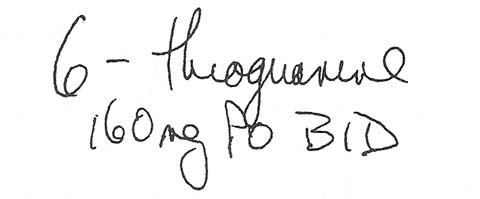
| Contents | Previous | Next |
A doctor on evening rounds wrote this order for a leukemic patient:
|
|
The nurse administering medications that evening wasn't familiar with this drug, but she didn't look it up. She thought about calling the hospital pharmacy, but it was closed for the night.
Anxious to start the patient's drug therapy and continue her rounds, the nurse decided to give the dose without checking it. She found a bottle labeled thioguanine 40 mg, left over from another patient, in .the nursing unit's drug cabinet. Thinking that the "6" preceding the drug name on the doctor's order meant the number of doses, she calculated the amount as 960 mg (6 x 160 mg), and administered this dose to the patient. She then charted the dose she'd given as thioguanine, 960 mg, P.O., tonight.
The next morning on rounds, the doctor discovered the error. The patient, who'd complained of nausea and vomiting during the night, was later found to have severe bone marrow depression-a direct result of the overdose. Fortunately, he survived the incident, but overdoses of thioguanine have caused death.
The error could have been avoided if the doctor hadn't written the prefix "6," which is a remnant of the drug's chemical name. Most references to the drug, including the manufacturer's label, don't use this prefix. (Other drugs you may see written this way are 6 mercaptopurine, 5 fluorouracil, and 5 flucytosine.)
But the nurse could have prevented the error, too, by not giving the drug until she got more information about it. When she couldn't reach a pharmacist, she could have called her nursing supervisor or the doctor, or consulted a drug reference.
A change in hospital policy could have prevented this error, too: Routine orders for cancer chemotherapy should be initiated only when a pharmacist is available. Because these drugs are extremely toxic, a pharmacist should review the order and dispense the drug himself. The nurse should always check what the pharmacist dispenses against what the doctor's order specifies before she administers the drug.